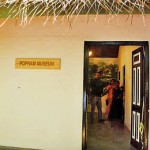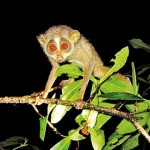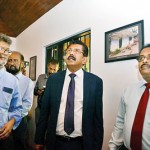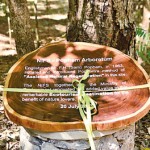News
Dambulla’s botanical paradise: Re-launching a labour of love
View(s):- British naval officer Sam Popham started in 1963 to conserve the biological diversity of the dry zone
- Priority given for villagers to provide lodging and food for eco-tourists
By Tharushi Weerasinghe
Popham’s Arboretum, Sri Lanka’s only botanical garden for trees in the dry-zone of Dambulla, is a five decade long labour of communal generosity and scientific innovation.
It was re-launched earlier this week as a joint venture between the Environment Ministry and the Education Ministry, and is a key location of the Environment Ministry’s eco-tourism project.
Speaking at the event, Environment Ministry Secretary Anil Jasinghe said spaces such as the arboretum were key in Sri Lanka’s positioning in the climate change debate.
- What was once a mud hut is now a museum
- A loris at the arboretum
- Environment Ministry Secretary Anil Jasinghe and others taking in the photographs at Sam Popham Museum
“If the global north is interested in truly alleviating the climate crisis it should consider investing in the tropical belts to help stop issues such as deforestation,” he said.
Dr Jasinghe said Sri Lanka’s Dambulla botanical garden was in one of the world’s 36 biodiversity hotspots, and was a good example of how intertwined tourism and biodiversity were in the local context.
The village people would be given priority with business opportunities in terms of accommodation and food for tourists.
Sam Popham, who the arboretum was named after, established it on 7.5 acres of thorny, scrub jungle and abandoned ‘chena’ land in the geographical centre of the country. Since then a further 27 acres had been acquired to form the garden that existed today.
Sam Popham arrived in Sri Lanka as a young naval officer and was an admirer of the Dambulla landscape. In 1963 he bought the land of scrub jungle. He began his labour of love conserving the biological diversity of the dry zone of Sri Lanka by creating what had since become home to more than100 species of timber trees, and 70 species of medicinal plants.
In its totality, the arboretum has more than 350 plant species belonging to 83 families with herbs, climbers, and parasites. The thick vegetation had also attracted forms of wildlife; 25 species of mammals including bats, 35 species of birds, 77 species of butterflies, and 12 species of dragonflies had been recorded in the arboretum thus far.
Popham donated the arboretum to the National Institute for Fundamental Studies (NIFS) under the condition that it be maintained as a hub for researchers and students of botany. In 1994 Popham was given an assistant, the curator Jayantha Amarasinghe, who held the post for 28 years, to help him with the maintenance and building of the arboretum.
“I introduced four nature trails to it so the arboretum could have an income but it was meager,” Mr. Amarasinghe said.
He said he had been out on a walk with a friend one night when they noticed the nocturnal and arboreal species of mammal loris on the trees. This sparked the idea for ‘night safaris’ to spot the nocturnal wildlife in the arboretum which had since generated substantial revenue through a website and Facebook page that he began.
Arboreta were usually developed by planting trees, but Sam Popham’s arboretum had been developed using a method known as Assisted Natural Regeneration (ANR), Mr. Amarsinghe pointed out.
ANR was one of the important methods used in restoration ecology. According to the NIFS, Popham’s Arboretum was a benchmark site in Sri Lanka for ANR. This method was a relatively simple, low-cost technique where the growth of natural forest seedlings was assisted and encouraged.
The arboretum today has a trail that begins at the Sam Popham Museum, a renovated mud hut that Popham used to live in when he was building the conservatory.
The rare trees and plants, labelled along with information boards on the pangolins and lorises that could be found on the trails, form a tranquil canopy of opportunity and offered hope for Sri Lanka with its dangerously declining amount of forest cover.
The best way to say that you found the home of your dreams is by finding it on Hitad.lk. We have listings for apartments for sale or rent in Sri Lanka, no matter what locale you're looking for! Whether you live in Colombo, Galle, Kandy, Matara, Jaffna and more - we've got them all!





